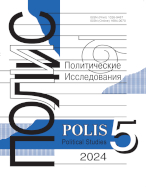Origin of Institutions by Selecting Modes of Behavior
Linetsky A.I.,
Cand. Sci. (Phys.-Math.), political scientist, businessman, linetskyalexander@hotmail.com
elibrary_id: 941066 |
DOI: 10.17976/jpps/2015.04.11
Linetsky A.I. Origin of Institutions by Selecting Modes of Behavior. – Polis. Political Studies. 2015. No. 4. https://doi.org/10.17976/jpps/2015.04.11
We treat institutions as a social phenomenon. Every fully developed institution consists of the three inseparable parts: 1) a standard behavioral practice; 2) a behavioral rule deemed as a symbolic reflection of this practice in human minds and 3) an institute that should support this practice by applying sanctions to them who breach this rule. The roots of historical origin of institutions were not clear by today. We argue that the two evolutionary factors play a key role in institutions emerging. These factors are: 1) a transfer – unconscious or conscious – of human behavioral patterns from a person to a person and 2) a selection – natural or artificial – of these behavioral patterns. We studied a few of historical cases, in which old political institutions rapidly destroyed or successfully build new ones up by using of this tool, and the emergence of political institutions in a natural way as by-product of unconscious transfer of human behavioral patterns and of natural selection of them. The latter cases are obviously similar to ethologic cases that describe an origin of standard non-heritable habits of animals. We do believe that institutional technique, i.e. conscious human actions aimed to maintain a frequency of behavioral patterns in human populations, is the most effective tool for radical political changes.
See also:
Linetsky A.I.,
Latent lnstitutions: standard behavior patterns occurred spontaneously and their political meaning. – Polis. Political Studies. 2014. No6
Linetsky A.I.,
Modernization of Traditional Societies: A Way to Prosperity or a Road to Nowhere?. – Polis. Political Studies. 2017. No4
Efremenko D.V., Dolgov A.Yu., Evseeva Ya.V.,
Russia Between System Catastrophes and Evolutionary Transformations: Aspects of Political Ontology. – Polis. Political Studies. 2017. No5
Ilyin M.V.,
«Flaky pastry» of politics: orders, regimes and practices. – Polis. Political Studies. 2014. No3
Ilyin M.V.,
“Flaky Pastry” of Politics: Recipes and Improvisations. – Polis. Political Studies. 2016. No1





.jpg)






 print
print
.jpg)
.jpg)